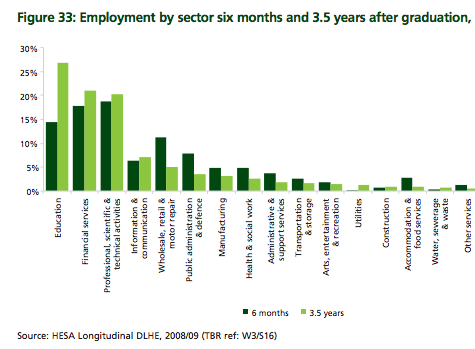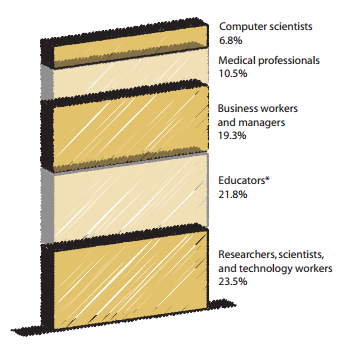Web developers!
Having a PhD in applied mathematics and having struggled quite a lot just last year in order to find my first job outside of the academia (guess what), I felt somehow compelled to post this answer. :)
Let me add some context and background to back it up. First of all, what follows is purely based on personal experience. However, I believe that having spent 10 years in the "math environment", hunted for a job in the industry, and eventually found one, should give enough credit to what I'll say.
Notes:
I have been doing research/working in Japan for the past 4 years, but I think this should not be a big discriminant.
I will focus on the private sector, that is, I will not consider research centers etc. that are also an obvious career possibility. I also won't consider the education sector (public or private) in general.
Anyway, what I realized during my job-hunting quest as a mathematician is that the majority of jobs for what you will be actually considered (in my case meaning that I had at least one interview) comes from the following type of industries:
- IT;
- Insurance;
- Finance;
- Pharmaceutical;
- Consulting.
I would say that more or less that's it. In most cases though, whatever the type of industry, most of the employers will be interested in two things when looking at a mathematician: programming and problem solving (mindset) skills.
The only area in which I honestly have the feeling that some serious mathematics is actually employed on a regular basis is finance (you can google for "quant jobs" and find tons of information). I had a few quant interviews and I was actually asked quite high-level purely mathematical questions. Those times only. Even in the quant case though, often programming skills are essential... At this point you should be able to start seeing where my original answer is coming from.
In the end, I have started working in a Fintech company, where eventually I might join a quantitative team and at least have the feeling of doing a job that is related to my background. For now, I am working as a web developer doing web applications. The level of mathematics I use is zero, and math comes into play only in the sense that it helps when it comes to logical thinking (that is obviously at the core of programming). So although there is an obvious pinch of irony in my first answer, there is at the same time a little bit of disappointment. The truth is that the business world and mathematics are still quite far from each other, despite what some will say. At least in the majority of cases.
Even among friends or former colleagues, if I think about people that now work in the industry they all belong to one of the above categories (many of them not doing or using any math at all). So I guess it is quite true in the end, you indeed find math majors in a variety of fields. It is how you get there to be tricky.
Off topic: The above was just my personal experience to give a small insight of what math majors do after graduation.
However, I would like to add that what I have learned, in the end, is that the most helpful thing a math major could do to himself/herself is to understand in advance what he/she wants to do next and work his/her math in that direction.
I never really given too much thought to that and when I decided to drop research I realized the hard way that finding a job was much more difficult than I expected. Definitely having a PhD and research experience was a double edged sword for many reasons, but this is another story.
Anyway, I would boil it all down to this:
If you love math as a subject and that's what you want to do, I
hardly see any career other than the standard academic one.
If you want to find a regular job in a company, it definitely helps to
improve coding skills focusing on maybe numerical analysis and/or
applied mathematics. And be prepared not to see any math at all
again.
When it comes to money, maybe the most financially rewarding career
for a mathematician is still in the financial field working as a
quant. They are notoriously tough jobs to get, but knowing in
advance that that's your goal might be an advantage so that you can
for example drop that algebraic topology class and attend stochastic
calculus instead.

